Select Language

NEW DELHI/ISLAMABAD (Reuters) -A blast was heard in Pakistan’s eastern city of Lahore on Thursday morning, according to broadcaster Geo TV and a Reuters witness, a day after Indian strikes at multiple locations in the country and fears of an escalation in conflict between the nuclear-armed neighbours.
There was no immediate word on the reason for the blast.
India hit "terrorist infrastructure" in Pakistan in the early hours of Wednesday, two weeks after it accused the Islamic nation of involvement in an attack in Indian Kashmir in which 26 people - mostly Hindu tourists - were killed.
Islamabad had denied the accusation and vowed to retaliate to the missile strikes, also saying it shot down five Indian aircraft. The Indian embassy in Beijing termed reports of fighter jets being shot down as "misinformation".
Pakistan says at least 31 of its civilians were killed and about 50 wounded in the strikes and in cross-border shelling that followed, while India says 13 of its civilians died and 43 were wounded.
The cross-border exchange of fire tapered off slightly overnight, Indian officials said.
India also conducted blackout drills in regions close to its border with Pakistan, including the northern city of Amritsar which houses the Golden Temple revered by Sikhs, in anticipation of retaliation to its strikes.
In Pakistan, meanwhile, most cities restored some normalcy and children returned to school, but in the border province of Punjab, hospitals and civil defence authorities remained on high alert.
Although Pakistan’s federal government has pledged to respond to India’s strikes, Defence Minister Khawaja Muhammad Asif told The New York Times (NYSE:NYT) on Wednesday that Pakistan was ready to de-escalate.
With India saying it would "respond" if Pakistan "responds", global powers have urged a calming of tensions. U.S. President Donald Trump said on Wednesday he hoped the countries could "work it out", adding he "will be there" if he can help.
The relationship between India and Pakistan has been fraught with tension since they gained independence from colonial Britain in 1947, and the countries have fought three wars, two of them over Kashmir.
The current escalation in tensions comes at a precarious time for Pakistan’s $350 billion economy, which is still recovering from an economic crisis that brought it to the brink of defaulting on external debt obligations in 2023 before it secured funding from the International Monetary Fund (IMF).
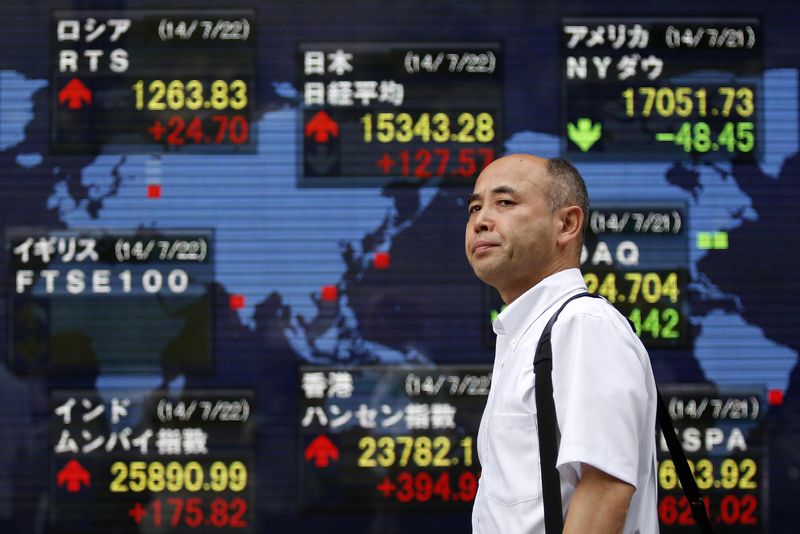
Most Asian stocks rose marginally on Thursday amid increased hopes for a deescalation in U.S. President Donald Trump’s tariff agenda ahead of trade talks between Washington and Beijing later this week.
Regional tech stocks also tracked some gains in their U.S. peers, after reports suggested that the Trump administration was planning to scale back export curbs on advanced artificial intelligence chips.
Asian markets also took a positive lead-in from Wall Street, which was buoyed by tech gains. U.S. stock index futures rose in Asian trade after Trump said he will announce a major trade deal later in the day, with reports suggesting the deal will be with Britain.
S&P 500 Futures added 0.5%, while Nasdaq 100 Futures rose 0.7%. But sentiment towards Wall Street also remained on edge after the Federal Reserve warned of heightened economic and trade uncertainty.
But regional sentiment still remained frail, especially amid heightened military tensions between India and Pakistan, after New Delhi launched strikes against alleged terrorist targets in Pakistan.
Islamabad retaliated with artillery strikes along the border region in Kashmir, with the clash marking some of the worst fighting between the two nuclear armed powers in recent years.
China stocks upbeat, US trade talks in focus
China’s Shanghai Shenzhen CSI 300 and Shanghai Composite indexes rose 0.4% and 0.1%, respectively, on Thursday.
Chinese stocks saw marginal strength after Washington and Beijing confirmed that officials will meet for trade talks in Switzerland this week. While the prospect of trade dialogue did drive some optimism over deescalation in a bitter U.S.-China trade war, it appeared unlikely that a trade deal would be struck soon.
Beijing signaled that the meeting was largely at the U.S.’ request, while Trump said he did not intend to lower his steep 145% tariffs against China before the talks.
Beijing has demanded that the U.S. lower its trade tariffs before any serious trade negotiations can begin– a demand that has been largely rebuked by Trump.
Asia tech rises on hopes of less strict US chip export curbs
Tech-heavy Asian bourses led gains on Thursday. Hong Kong’s Hang Seng index added 0.9%, while Japan’s Nikkei 225 rose 0.4%. South Korea’s KOSPI rose 0.3%.
Tech was boosted chiefly by reports that the U.S. will scale back Biden-era curbs on advanced AI chip exports, which bodes well for U.S.-based chipmakers. But such a move also heralds more business for the Asian companies that supply to U.S. chipmakers.
Regional suppliers of AI major Nvidia– such as Taiwan’s TSMC (TW:2330) and South Korea’s SK Hynix Inc (KS:000660)– rose between 0.5% and 1.5% on Thursday. Japan’s Advantest Corp. (TYO:6857) added 2.8%, while Chinese internet stocks– such as Alibaba (HK:9988) and Tencent Holdings Ltd (HK:0700)– rose on the prospect of being able to source more advanced U.S. chips for their AI ambitions.
Broader Asian markets were mostly positive. Australia’s ASX 200 added 0.2%, although bigger gains were held back by a 3% drop in ANZ Group Holdings Ltd (ASX:ANZ), after the major bank clocked middling first-half earnings.
Westpac Banking Corp (ASX:WBC) also weighed on the ASX with a nearly 5% slide, as it traded ex-dividend.
Futures for India’s Nifty 50 index rose 0.5%, heralding a positive open, with local stocks showing limited reaction to heightened tensions with Pakistan. The Nifty 50 rose about 0.1% on Wednesday.
Singapore’s Straits Times index was an outlier, losing about 0.2%, while Japan’s TOPIX index shed 0.2%.
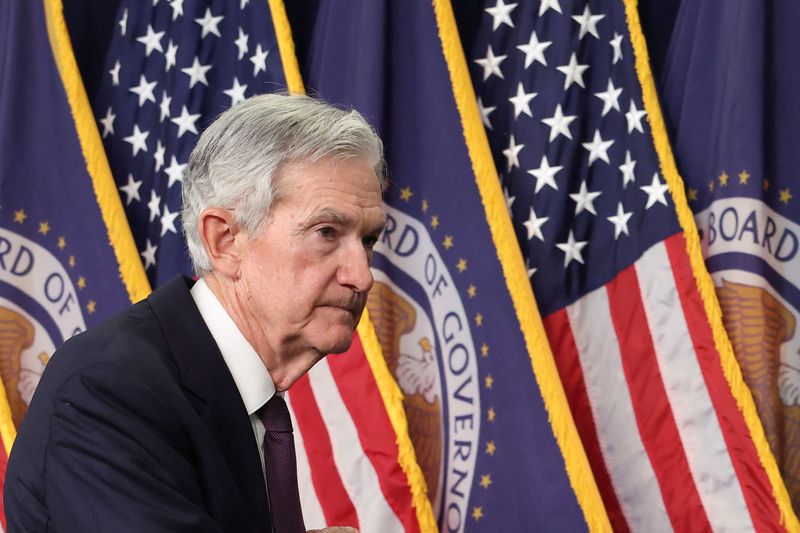
NEW YORK (Reuters) - Federal Reserve Chairman Jerome Powell said on Wednesday that he never seeks to meet with any U.S. president and to the extent he has had such a meeting, it’s because the elected leader sought the interaction.
"I’ve never asked for a meeting with any president and I never will," Powell said at a press conference following the close of the Fed’s policy-setting committee meeting. "There’s never a reason for me to ask for a meeting, it’s always been the other way."
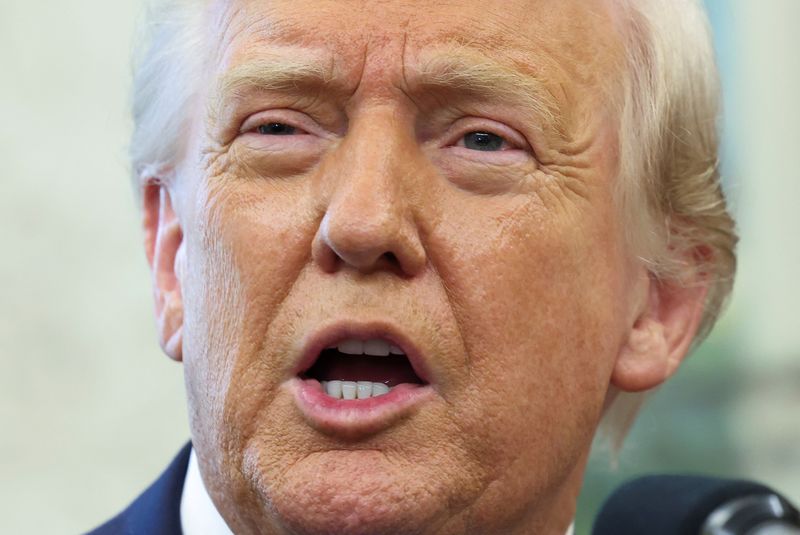
U.S. President Donald Trump said on Wednesday he will not consider lowering his steep, 145% trade tariffs on China, even as his administration prepares to engage in trade negotiations with Beijing.
Trump answered “no” when asked by a reporter at the White House if he was willing to scale back his tariffs to bring China to the negotiating table.
Trump’s comment comes just days before Treasury Secretary Scott Bessent and Trade Representative Jamieson Greer will meet their Chinese counterparts in Switzerland for trade talks.
Chinese officials said the meeting was taking place on Washington’s request, and that Beijing remained opposed to Trump’s tariffs.
Trump had earlier this week said he had no immediate plans to sign any trade deals, as his administration negotiates with several major trading partners, who face his reciprocal tariffs.
Washington announced on Tuesday that talks with China will take place in Switzerland. Although officials are expected to discuss trade, investors were doubtful that any progress would come from the meetings, given that both Washington and Beijing have struck largely hawkish stances over their recent tariff exchange.
China had imposed 125% tariffs on American goods in retaliation to Trump, and had signalled little intent to negotiate until Trump brought down his levies.
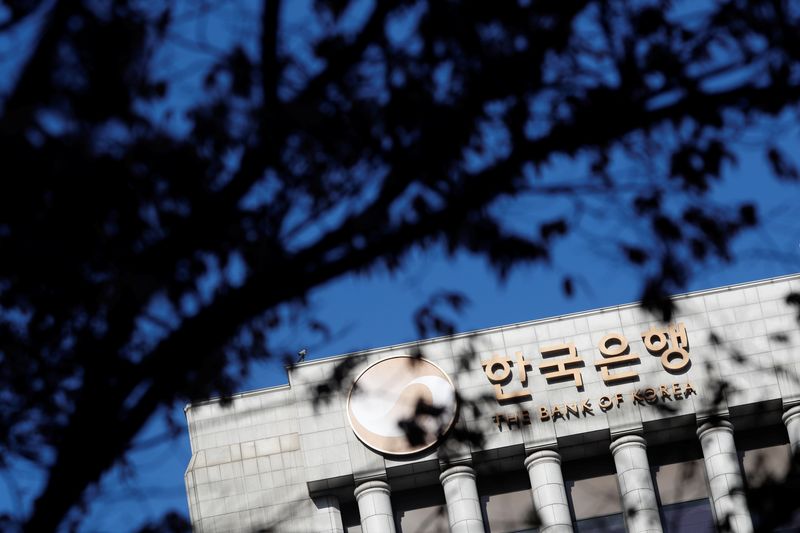
SEOUL (Reuters) -Most of the Bank of Korea’s board members assessed headwinds to South Korea’s economy were growing faster than expected, a factor that would warrant more interest rate cuts, minutes from last month’s meeting showed on Wednesday.
"With economic growth this year expected to fall short of previous forecasts due to the economic slowdown, the need for preemptive interest rate cuts is growing," one of the seven board members said, according to the minutes from the bank’s April 17 rate review.
The BOK’s seven-member board on April 17 held the benchmark interest rate at 2.75% as expected at its monetary policy review and signaled it would cut rates in May to cope with "significant" risks to the economy from U.S. President Donald Trump’s sweeping tariff policy.
A majority of economists surveyed by Reuters expect the BOK to lower the benchmark interest rate to 2.25% by the end of the third quarter of this year as shifting U.S. tariff policy fuels fears of a global recession and threatens to sharply curtail exports out of Asia’s fourth-largest economy.
The BOK next reviews policy interest rates on May 29.
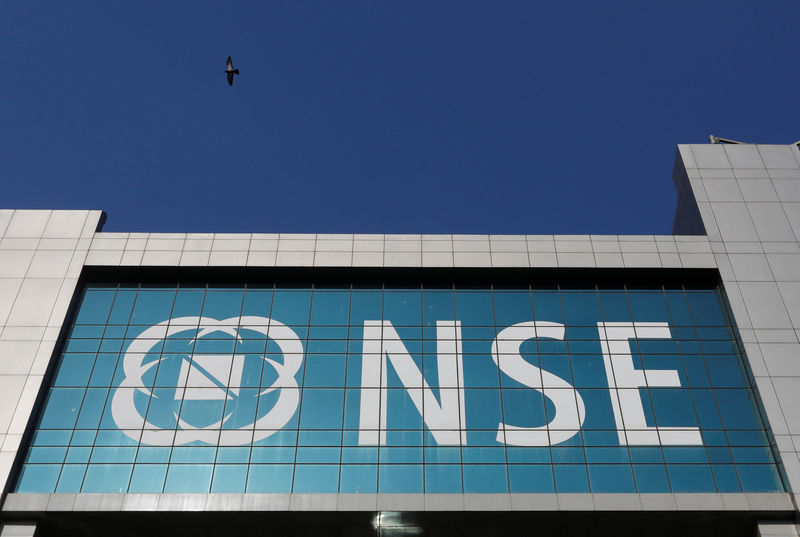
Indian stocks flitted in a flat-to-low range in early trade on Wednesday as investors grappled with a military escalation against Pakistan, while positive signals on U.S.-China trade talks offered some support.
The Nifty 50 benchmark rose 0.1% to 24,508.0 points by 09:44 IST (04:14 GMT), while the BSE Sensex 30 rose 0.2% to 80,782.40 points. Both indexes had opened lower, even as Gift Nifty 50 Futures pointed to a positive open.
India carried out strikes against nine alleged terrorist targets in Pakistan in the early hours of Wednesday, which it said were in retaliation for a deadly terrorist attack in Indian Kashmir in April.
Pakistan decried the move, retaliating with artillery strikes along the border in Kashmir, and also claimed to have shot down at least three Indian planes.
The strikes represented the worst fighting between the two nuclear armed nations in decades, leaving investors on edge over an escalation in tensions.
Still, bigger losses in Indian shares were limited by cheer over U.S.-China trade talks, which lifted broader Asian markets. U.S. and Chinese officials will meet for trade negotiations in Switzerland later this week, the two countries said on Tuesday.
Tata Motors Ltd (NSE:TAMO) (NYSE:TTM) was also a major supporter of the Nifty, rising nearly 3% after shareholders approved a plan where the company will split into two listed entities. The stock was the biggest gainer on the Nifty.
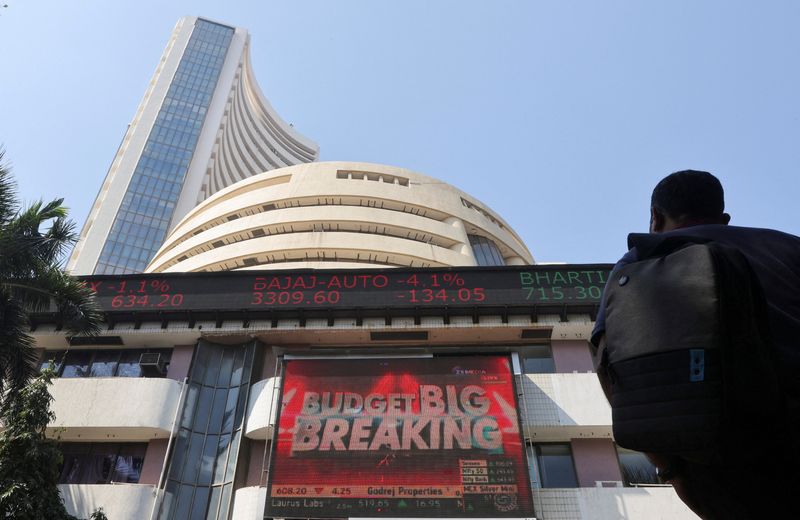
Most Asian stocks rose on Wednesday, with Chinese markets in the lead after the announcement of trade talks with the U.S. pushed up hopes for a deescalation in an ongoing trade war.
Other markets were less upbeat, with Indian stocks squarely in focus after a military escalation with neighbor Pakistan earlier in the day. Indian stock futures, however, pointed to a positive open.
Regional markets took a negative lead-in from Wall Street, which closed lower overnight after U.S. President Donald Trump signaled he was in no hurry to sign any trade deals. But U.S. stock index futures rose in Asian trade after the announcement of trade talks with China, with S&P 500 Futures adding 0.6%.
Sentiment was also testy before the conclusion of a Federal Reserve meeting later on Wednesday, where the central bank is widely expected to keep rates steady and signal no changes in the near-term.
Chinese stocks rise, Hong Kong rallies on trade talk cheer
China’s Shanghai Shenzhen CSI 300 and Shanghai Composite indexes added about 0.5% each, while Hong Kong’s Hang Seng blew past its regional peers with a 1.5% rise.
U.S. Treasury Secretary Scott Bessent and Trade Representative Jamieson Greer will meet their Chinese counterparts for trade talks when they travel to Switzerland this week, their respective offices said late-Tuesday.
The announcement marks the clearest signal yet on trade negotiations between Beijing and Washington, after officials from both sides signaled some openness to talks last week.
But whether this will result in immediate deescalation still remains to be seen, especially as Trump signaled he was in no hurry to sign a trade deal with any country.
Steep trade tariffs between the two countries– following an escalation in their trade war in April– still remained in place. A swathe of recent economic readings also showed both the U.S. and China were facing headwinds from the trade conflict.
Chinese markets were also encouraged by the People’s Bank cutting a key reserve requirement ratio for local banks, which heralds more monetary stimulus for the economy.
Indian stocks set for strong open despite Pakistan military escalation
India’s Gift Nifty 50 Futures rose 0.5% in morning trade, heralding a positive open for the Nifty 50 even as tensions with Pakistan rose substantially on Wednesday.
India said it had carried out strikes against alleged terrorist encampments in Pakistan early on Wednesday, while Islamabad claimed to have retaliated with artillery strikes, and had also shot down five Indian planes.
The spike in tensions between the two nuclear armed countries comes after a deadly terrorist attack in India’s Kashmir region last month, which New Delhi blamed on Pakistan.
The renewed tensions represent the worst fighting between the two countries in over two decades, leaving investors on edge over a worsening in tensions. Indian stocks were also nursing losses in recent weeks on fears of an escalation.
Broader Asian stocks were mildly higher, with investors also skittish before the conclusion of a Fed meeting later in the day.
Australia’s ASX 200 index rose 0.2%, while South Korea’s KOSPI added 0.4%.
Japan’s Nikkei 225 index rose 0.3%, while the TOPIX index added 0.4%.
Singapore’s Straits Times index shed 0.2%, weighed chiefly by losses in major bank UOB (SGX:UOBH), after it clocked softer-than-expected quarterly earnings.

U.S. Treasury Secretary Scott Bessent and Trade Representative Jamieson Greer will meet with their Chinese counterparts for trade negotiations in Switzerland this week, their offices said on Tuesday.
Both Bessent and Greer will meet with Swiss President Karin Keller-Sutter, and will also meet with their counterparts from the People’s Republic of China “to discuss trade matters,” their respective offices said in a statement. The two will travel to Switzerland on May 8.
“I look forward to productive talks as we work towards rebalancing the international economic system towards better serving the interests of the United States,” Bessent said in a statement.
China’s Foreign Minister said that Vice Premier He Lifeng, Beijing’s lead official in U.S.-China trade matters, will meet Bessent in Switzerland, according to NBC.
The talks mark a potential thaw in Sino-U.S. relations, after the two countries became embroiled in a bitter trade war through April. U.S. President Donald Trump had imposed 145% tariffs on Chinese goods, drawing retaliatory measures of 125% from Beijing.
The tariff exchange had rattled global markets with the prospect of widespread economic disruptions, with recent data points from China and the U.S. already showing some deterioration.
U.S. stock index futures- which had initially fallen on Tuesday evening- rose after the trade talks were announced. S&P 500 Futures were up 0.7% by 19:15 ET (23:15 GMT).
The announcement of the talks in Switzerland comes following some encouraging comments from both Chinese and U.S. officials, that they were open to trade talks. Bessent has also repeatedly warned that the steep trade tariffs were unsustainable, and that he expects deescalation soon.
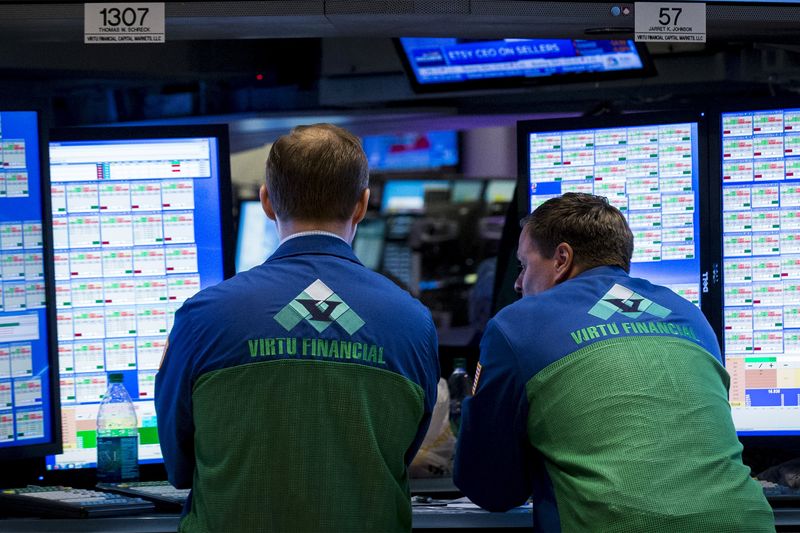
The S&P 500 closed lower Tuesday as investors assessed a lack of updates on U.S.-China trade progress and awaited the Federal Reserve rate decision due Wednesday.
At 4:00 p.m. ET (20:00 GMT), the Dow Jones Industrial Average dropped 397 points, or 1%, the S&P 500 index slipped 0.8%, and the NASDAQ Composite fell 0.9%.
Trump says China willing to negotiate on trade, but stops shorts of signalling progress
President Donald Trump said China wanted to negotiate a trade deal to end the current trade war, but stopped short of signalling urgency to resolve the conflict, saying the U.S. and China would meet the right time.
Markets had briefly cut some losses on hopes of a major announcement on trade after Trump touted he would have "very, very big announcement to make," ahead of his administration’s trip to the Middle East. But the reprieve was short lived after Trump said the big announcement may "not necessarily" be on any trade-related development.
Fed meeting looms large
The Fed kicks off its two-day meeting Tuesday, with the central bank expected to hold interest rates steady when it concludes on Wednesday.
Fed Chair Jerome Powell recently signalled that the policymakers are in a wait-and-see mode amid tariff concerns. This comes despite overt pressure from President Trump and Treasury Secretary Scott Bessent to cut policy rates.
Given the decision is largely seen as a forgone conclusion, the focus will be on comments from Powell to get insights into the Fed’s future rate path.
A reading of activity in the key U.S. services sector, which accounts for more than two-thirds of the economy’s output, was stronger than anticipated, signaling that businesses may be able to shrug off headwinds from the tariffs. Still, a metric of prices paid by services companies rose, adding to worries that the duties could fuel inflationary pressures.
The U.S. goods and services deficit widened in March following an uptick in imports as businesses raced to lock in prices before the implementation of elevated tariffs.
Adjusted for seasonality but not price changes, the trade gap rose by 14.0% to $140.5 billion from a downwardly-revised $123.2 billion in February, according to data from the Commerce Department’s Bureau of Economic Analysis on Tuesday.
Corporate results continue
There have been a number of corporations releasing quarterly earnings Tuesday, as the first-quarter results season continued.
Ford (NYSE:F) stock rose more than 2% even as the auto giant slashed its full-year guidance, noting uncertainty around the outlook due to Trump’s tariffs.
Palantir Technologies (NASDAQ:PLTR) stock slumped about 12% after the artificial intelligence-focused data firm reported quarterly numbers that disappointed heightened market expectation, even as it lifted its annual sales guidance.
Tesla (NASDAQ:TSLA) stock fell more than1% after the EV manufacturer saw a significant drop in its sales volume in Germany in April, while new car sales in the United Kingdom dropped by 62% year-on-year, hitting their lowest point in over two years.
DoorDash (NASDAQ:DASH) stock fell more than 7% after the food delivery company’s first-quarter revenue fell short of estimates, while also confirming it has made a formal offer to acquire U.K. rival Deliveroo (LON:ROO).
Mattel (NASDAQ:MAT) stock added more than 2% despite the toymaker pausing its 2025 full-year guidance due to tariff uncertainty. The paused on guidance came as the company reported quarterly results that were better than feared.
(Peter Nurse, Ayushman Ojha contributed to his article.)
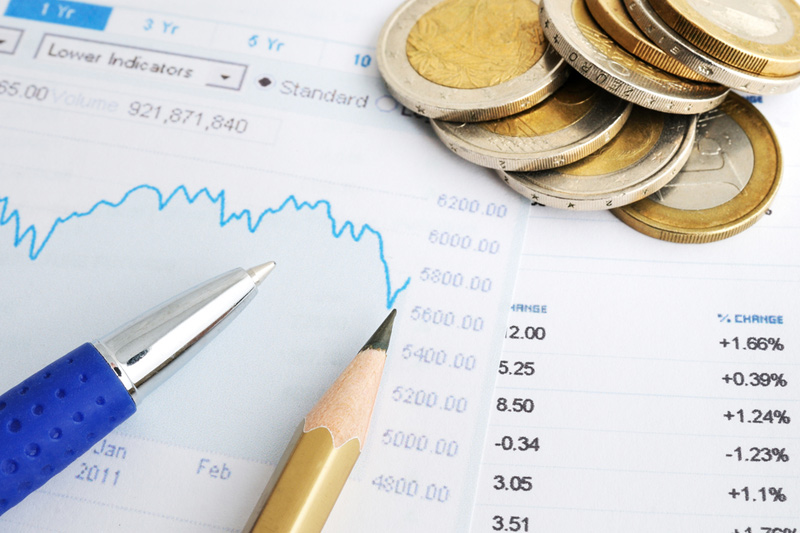
After nearly three years, France’s manufacturing sector has experienced an increase in output, according to a survey published on Friday.
Increased military spending could potentially balance out the uncertainties caused by U.S. tariffs.
The final purchasing managers index (PMI), a key indicator of economic health in the manufacturing sector, rose to 48.7 in April from 48.5 in March. This information was compiled by S&P Global for the HCOB.
It is worth noting that the PMI is an important economic indicator, measuring the activity level of purchasing managers in the manufacturing sector.
A PMI above 50 represents an expansion when compared to the previous month, while a PMI under 50 represents a contraction.
The rise to 48.7, though still under 50, marks a significant improvement for France’s manufacturing sector.
This article was generated with the support of AI and reviewed by an editor. For more information see our T&C.

